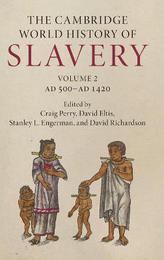
|
The Cambridge World History of Slavery: Volume 2, AD 500-AD 1420
Hardback
Main Details
Description
Medieval slavery has received little attention relative to slavery in ancient Greece and Rome and in the early modern Atlantic world. This imbalance in the scholarship has led many to assume that slavery was of minor importance in the Middle Ages. In fact, the practice of slavery continued unabated across the globe throughout the medieval millennium. This volume - the final volume in The Cambridge World History of Slavery - covers the period between the fall of Rome and the rise of the transatlantic plantation complexes by assembling twenty-three original essays, written by scholars acknowledged as leaders in their respective fields. The volume demonstrates the continual and central presence of slavery in societies worldwide between 500 CE and 1420 CE. The essays analyze key concepts in the history of slavery, including gender, trade, empire, state formation and diplomacy, labor, childhood, social status and mobility, cultural attitudes, spectrums of dependency and coercion, and life histories of enslaved people.
Author Biography
Craig Perry is Assistant Professor in the Department of Middle Eastern and South Asian Studies and the Tam Institute for Jewish Studies at Emory University. His research on slavery in the medieval Middle East has been supported by fellowships from the National Endowment for the Humanities, Oxford University, and the Foundation for Jewish Culture. David Eltis is Emeritus Professor of History at Emory University, and has held visiting appointments at Harvard, Oxford, and Yale Universities. He is author of four prize-winning books and articles on slavery and the slave trade. Stanley L. Engerman is Emeritus Professor of Economics and former Professor of History at the University of Rochester. He has held visiting appointments at Harvard, Oxford, and Cambridge Universities, and has written over one hundred essays and co-authored or co- edited 25 books on slavery and related subjects. He is a recipient of the Bancroft Prize and the Guggenheim Fellowship. David Richardson is founder and former director (2004-2012) of the Wilberforce Institute for the study of Slavery and Emancipation, Hull. He has held visiting positions at Harvard and Yale Universities. He has written extensively on transatlantic slavery and its impacts and more recently on contemporary slavery in historical perspective. He authored (with David Eltis) the award winning Atlas of the Transatlantic Slave Trade (Yale, 2010).
Reviews'No slave voices survive. But what can be excavated from the evidence is considered here in a scholarly, detailed, clearly argued and thoroughly worthwhile collection of essays.' Literary Review "This first instalment in the four-volume Cambridge World History of Slavery is an impressive synthesis of current Anglophone scholarship on slavery in the Greek and Roman worlds. It is a very welcome addition to the bibliography. With its wide chronological and thematic scope, its detailed coverage of key scholarship and primary sources and the authority of the contributors, it is sure to become the first port of call for students and for scholars approaching a period or topic for the first time. This substantial volume is certainly the new authority on Greco-Roman slavery. It is an invaluable resource for students and scholars alike." Miles Lavan, The Journal of Roman Studies
|